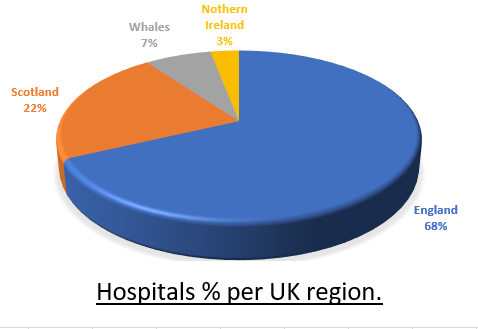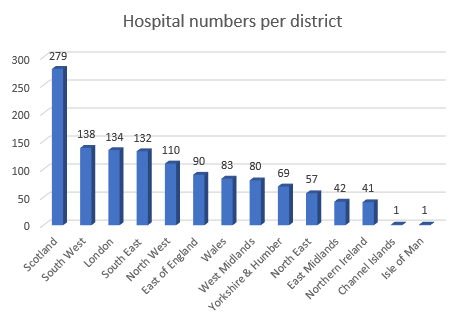How many hospitals are in the UK?
13 Jul 2020 | Anne Marie Fogarty
| Share with

As of April 2020, there are also 5 temporary Nightingale Hospitals being set up in London, Bristol, Birmingham, Manchester and Harrogate to provide more beds for Coronavirus patients – however, these will close once the pandemic is under control and the additional space is no longer required.
How many hospitals are in each UK region
Looking at the different regions,
-
68% of all hospitals are in England (854 hospitals)
-
Scotland has 22% of the hospitals at 279
-
Wales has 7% with 83 hospitals
-
Northern Ireland has just 3% with 41 hospitals.
Hospital numbers per district
In more detail, here’s the full list of hospital numbers per district:
Scotland 279
South West 138
London 134
South East 132
North West 110
East of England 90
Wales 83
West Midlands 80
Yorkshire & Humber 69
North East 57
East Midlands 42
Northern Ireland 41
Channel Islands 1
Isle of Man 1
When considering the number of patients and hospitals in each region, there’s a huge disparity between regions. For example, England is home to 84% of the UK population, but there’s only 68% of the total number of hospitals. However, there are very large multi-discipline hospitals serving large communities all across England. Whereas there are many smaller hospitals, serving communities in the less populated, remote areas of Scotland and Wales.
Local Authorities info
Local authorities have, since 1 April 2013, been responsible for improving the health of their local population and for public health services including most sexual health services and services aimed at reducing drug and alcohol misuse. The Secretary of State continues to have overall responsibility for improving health – with national public health functions delegated to Public Health England.
Health is a devolved matter in Scotland, Wales and Northern Ireland although the devolved administrations currently retain substantially the same legislative framework.
In addition to their new public health responsibilities, local authority social services have existing duties to provide welfare services such as residential accommodation for those who are in need of care, because of age, illness or disability, which they cannot otherwise obtain. Primary health needs continue to be met by the NHS and disputes can arise over whether an individual’s care should be paid for by the NHS or by the local authority on a means-tested basis.



13 Jul 2020 | Leave a comment
Share with socials